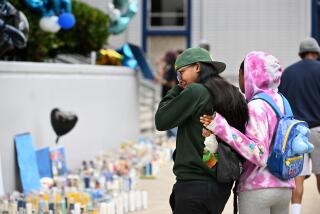Panthers Firefighter Shot to Death at Party : Crenshaw: Maurice White’s violent death is in sharp contrast to his work in the group that came to symbolize the possibility for peaceful coexistence.
- Share via
Maurice White, an original member of the South-Central Panthers firefighting team, died earlier this month from gunshot wounds inflicted during a party in South-Central Los Angeles. He was 25.
Newton Division police said White was shot March 5 when a fight broke out at a house party on East 22nd Street. It was unclear if White was directly involved in the dispute.
White’s violent death is in sharp contrast to his work in the Panthers, a group that came to symbolize the possibility for peaceful coexistence and team spirit among former gang members. White joined the Panthers last June when the job training program, co-sponsored by the U.S. Forestry Service, became available through the Crenshaw-based L.A. Unemployed Council.
The two dozen Panthers quickly attracted media attention because the one-time rival gang members learned to work side by side in life-threatening situations. The Panthers received national media coverage last fall when the team spent 16-hour days battling the disastrous Malibu and Altadena fires.
White, called “Reesey” by close friends and family, was one of the most inspirational members of the team, recalled fellow Panther Clinzell Washington.
“He was a really caring guy,” said Washington. “If he saw you down, he would help you, pump you up, keep you going,” said Washington. “He gave you this feeling that if he could do it, so could you.”
White, a student at Compton College who said he most enjoyed philosophy courses, was also remembered for his constant espousing of black pride and discussions of how to improve conditions in African American communities. He frequently sported African beads, earrings and other jewelry.
Panther Clifton Dunlap said White, who had been involved with gangs, saw the Panthers as a perfect opportunity for black people to come together.
“We might have had our differences, but we worked together,” Dunlap said. “Maurice always thought positively about the black community. He used to work so hard fighting fires he’d always sleep the whole way back home on the bus. But he was a great motivator. We truly lost our brother.”


